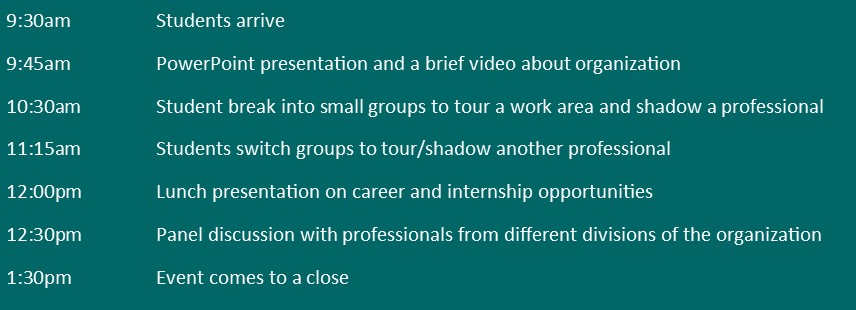
What is ACES Career Readiness?
According to a 2013 Gallup report, less than 28% of high school students and 50% of college students were developing real-world problem-solving skills. Data gathered by the National Center for Education Statistics (NCES) in 2012 showed a significant absence of career exploration and preparation in public high schools. Employers surveyed by the National Association of Colleges and Employers (NACE) also recommended that students gain hands-on, real-world experiences during their education and master career-readiness skills in order to have a competitive advantage in the workforce.
Based on successful piloted career readiness programming of 100 ACES students funded by the HESS Construction Company, the ACES Career Readiness Program aims to significantly improve career readiness through experiential learning activities in partnership with regional employers and workforce-readiness skill-building.
The ACES Pathway
Achieving Collegiate Excellence and Success [ACES] is a collaboration between Montgomery County Public Schools, Montgomery College, and the Universities at Shady Grove to provide individualized support and interventions that will increase college enrollment and completion, especially among student groups that are underrepresented in higher education. Students apply to ACES in the spring of 10th grade and, if accepted to the program, are assigned an academic coach during their 11th and 12th grades. Coaching and support through Montgomery College and Universities at Shady Grove will continue for ACES students who choose to attend these institutions.

Career Readiness with ACES
To support degree completion goals, ACES students receive career guidance, training, and experience at every level of the academic pathway. Programming concepts and activities are based on research-supported best practices specifically designed for success in three progressive segments.
Career Experiential Pathway with ACES
Through the ACES Career Readiness program, regional employers can engage local students in a progressive pathway of career experiential models as students advance academically. This integrated program between MCPS, MC, and USG is a unique opportunity for organizations to introduce their workplace to a pool of internship candidates and grow a local workforce pipeline.
Career Immersion
We are currently looking to partner with regional employers to participate in high school student career immersions. Career immersions are one-day activities on-site at a respective employer location, providing students with an exploratory experience into the “day in the life” of a given organization. Career Immersions provide students with an opportunity for professional development and provide an in-depth understanding of the overarching processes of a respective organization. A Career Immersion offers a level of exposure to companies that can attract students and motivate them to consider a career in the field.
Below is a sample itinerary for a Career Immersion event:

To learn more about the Career Immersion model of career experiential activity, see USG Employer Toolkit Career Immersion website.
Job Shadowing
Help students learn about the job by walking through a work day. The job shadowing work experience is a temporary, unpaid activity where the student follows an employee at an organization to learn about the occupation and industry. Job shadowing provides more insight than just reading a job description or asking an employee to describe what they do.
To learn more about the Job Shadowing model of career experiential activity, see USG Employer Toolkit Job Shadowing website.
VOLUNTEER TO HOST A STUDENT FOR JOB SHADOWING
Virtual Internships
A virtual internship is an opportunity to host a student intern where the majority or all of work will be conducted remotely. Virtual interns can be hired to work on a project basis for a series of hours (10-15 hours), a number of weeks (8-10 weeks), or for an entire academic semester or longer.
To learn more about the Virtual Internship model of career experiential activity, see USG Employer Toolkit Virtual Internship website.
Microinternships
Microinternships are short-term placements with an employer, generally with a maximum duration of 30 days, that commonly focus on the completion of a short, clearly defined project created by the host organization. Because placements are generally shorter than a traditional internship, microinternships offer a level of convenience and accessibility to organizations that might not ordinarily be in a position to support a traditional internship.
To learn more about the Microinternship model of career experiential activity, see USG Employer Toolkit Microinternship website.
We are always looking to connect with employers and discuss how this program can benefit both students and the organization in creating a diverse local talent pipeline. To learn more, contact us.


